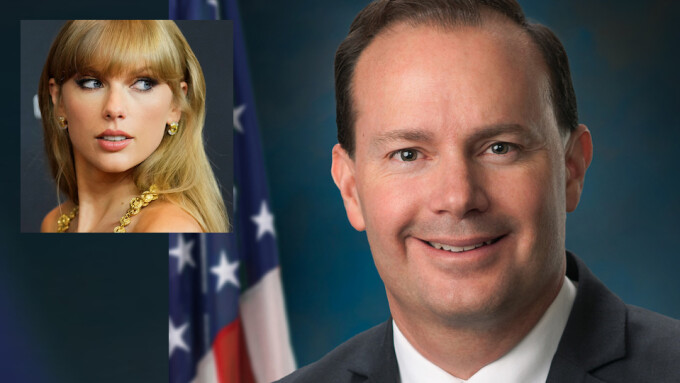SALT LAKE CITY — Anti-porn U.S. Senator Mike Lee has inserted himself into the controversy over recent nonconsensual AI content featuring pop singer Taylor Swift, by advocating for a new federal law that would mirror a current, extreme Utah law targeting consensual adult content.
Lee took to social media to ask Swift to support his “PROTECT Act.”
“Hi @taylorswift13 and @treepaine,” Lee posted on X. “I have legislation to help get harmful deepfake images removed quickly, and create a way for people to sue companies that don’t take them down. I’m re-introducing the PROTECT Act next week. Would love your support!”
Lee’s post was then magnified over the weekend by Utah’s Deseret News, a publication that regularly publishes the claims of anti-porn propagandists, which are often religiously motivated, without probing them.
Lee’s office explained that his soon-to-be-reintroduced PROTECT act would “require pornography sites to verify the age of all participants in pornographic images; require sites to obtain verified consent forms from individuals uploading content and those appearing in uploaded content; and mandate that websites quickly remove images upon receiving notice they uploaded without consent.”
Lee’s attempt to hijack the Swift controversy blurs the line between consensual adult content and nonconsensual use of someone’s image to generate realistic images.
First Amendment expert Lawrence Walters, of Walters Law Group, told XBIZ that Lee “is attempting to capitalize on the high-profile Taylor Swift AI image incident to push legislation which has little to do with AI, and more to do with censorship of constitutionally protected speech.”
According to Walters, the PROTECT Act “would impose unconstitutional age and consent verification obligations on any interactive computer service which allow uploads of sexually explicit content. The legislation burdens the publication of speech based solely on its content, which raises the same First Amendment concerns that caused Section 2257 to be found largely unconstitutional by the federal courts.”
Lee’s proposal, he added, “mandates an impractical content removal deadline of 72 hours from receipt of the request regardless of the size or resources of the online platform, and seeks to regulate websites on a worldwide basis if the content is available in the U.S.”
The issue of deepfakes, Walters concluded, “is worthy of reasoned debate and consideration as opposed to a knee-jerk reaction to a Taylor Swift news story in the form of the PROTECT Act.”








